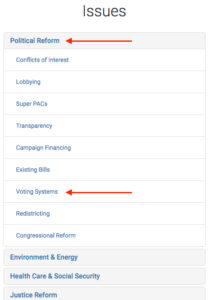This is the second of a 2-part series about America’s system of voting. In the first part of this story, Joe Voter had returned to PeopleCount. He realized that even with a large fraction of voters participating, it didn’t truly tell what the average American preferred. But mainly it was letting him easily connect with his representative so she could truly represent him.
What does his representative say?
He sees there are some recent reports and clicks on his representative’s. Two weeks ago, she said she supports Instant Runoff voting, but a couple of the other voting methods look good, too. So she signed on as a cosponsor on a bill to use Instant Runoff for the next two elections and to put a question on every ballot asking if we should stick with this method, go back to Winner-take-all or try another one.
That seems good to Joe. He gives her an A. Then he reads the report that came out two days later from a challenger. The challenger wants to add another section to the bill that says the government will support a website that says what the result of each race is, and what it would have been for each of the different voting methods. That sounds even better. Joe gives him an A and changes the incumbent’s grade to a B.
A new choice
Joe then looks at the new question. It came out just two days ago. It asks if Joe likes the compromise, plus if he wants the government to show results for each race using the different voting methods, or if the government should just make the data publicly available so others can show the results. Joe prefers small government, so he votes for the second option. Only about 1% of people have voted on it, so the results doesn’t mean much yet. He’s finished for now.
Returning to the site
Two weeks later, he returns to the site. About a quarter of voters have answered the question about the voting system compromise and about 92% of them support it.
He returns to the site every week or two for 5-20 minutes and answers questions on another issue or two. Once he spent 30 minutes and read several articles about changing drug laws and about banning the check-box on job applications asking if someone was ever convicted of a crime.
The ban-the-box question seemed interesting. Banning it seemed bad- he’d certainly want to be able to avoid hiring an ex-con if he advertised a job-opening. He clicked on More Information and read a short article asking: Do we really believe in forgiveness? If someone has served time for an offense, should we give them a chance at an honest life? Should we give them a fair chance at a job? What if the person now has 20 years of an admirable life since they left prison? He read another article about rehabilitating ex-cons. Studies showed that ex-cons were much more likely to live honestly if they had jobs. Another speculated that if we banned the checkbox, employers would want some assurances about ex-cons and services would spring up to support them avoiding crime and even provide report-cards for them. Plus, employers could about prior convictions during the interview. He ended up supporting the ban.
Can we have a better system of voting?
About two months later on his commute home, he heard on the radio that Congress was considering a bill about changing our system of voting. The reporter had noted that the parties were against it, but the people wanted it. And the members of Congress that were staying loyal to their parties were getting very poor grades on PeopleCount. If they voted against it, challengers were planning to use those votes to help unseat them in the next election.
When Joe got home, he turned on his tablet and returned to the issue about voting systems. He read his incumbent’s report and it said a bill had come out of committee and would go to the floor soon. It was basically the bill he liked, with the election results being available to the public via a web data service. VoteSmart.org had promised they’d publish the comparisons between the results using different systems of voting, plus they’d work with the government to develop standards. Three news organizations and two polling companies had stepped up, too. He gave some more A’s.
And he smiled. America was finally listening to people instead of just the parties and the wealthy. American politics were finally on the right track.
If you want an announcement when the right track becomes available, please add your email address to our announcement list.

